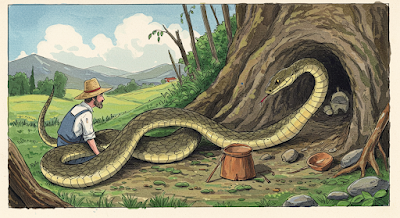Example of Narrative Text - Discovering the Komodo Lizard
Example of Narrative Text
Discovering the Komodo Lizard
Two fishermen tied their boat up, hurried out of the boat and ran down the streets of their hometown. 'We saw a dragon on Komodo Island,' they shouted. 'We saw a dragon!'
A man heard their shouts. He was an American named Douglas Burden. Burden was a naturalist. A naturalist is a person who tries to learn, as much as he can about things that live. He believed what the two men said but there was only one way to find out; He had to go to Komodo Island himself and brought back one of the dragons for people to see.
So Douglas Burden and some friends sailed halfway around the world to the tiny island off the coast of Indonesia. When they reached the island they were afraid that the traps and cages they had with them would not be strong enough toehold the dragons. There were dragon son the island. They weren't the same dragon’s people see in picture books and in children's stories, but they looked more like dragons than any other animal Burden had ever seen. They were really large lizard - some of them three metres long and as heavy as two men. Their legs were short and thick and on their feet were sharp claws like knives. Although they did not breathe fire like the dragons in story books, the lizards had yellow forked tongues, that moved quickly in and out of their mouths.
It was difficult and dangerous to catch the lizards. Sometimes the lizards attacked the men. Sometimes the men had to kill the lizards to save themselves.
Finally, Burden and his friends caught two live Komodos and put them in cages on their ship. Then they sailed back to America.
When the two dragons were put into the Brooklyn Zoo in New York City, people came from all over America to see them. Burden, was pleased that so many people had a chance to see two live dragons.
That was more than 45 year ago. today there are no more live dragons anywhere in the world except on the tiny island of Komodo. They still live there.





nevermind
cool story